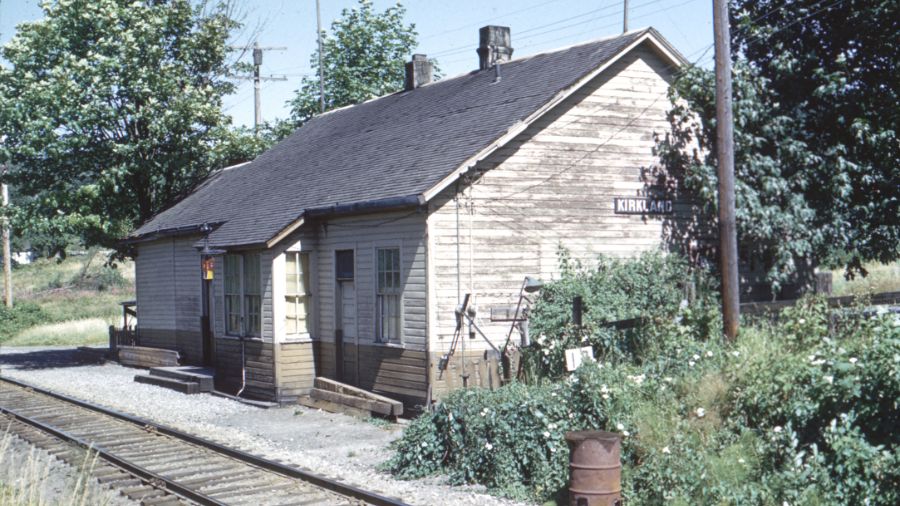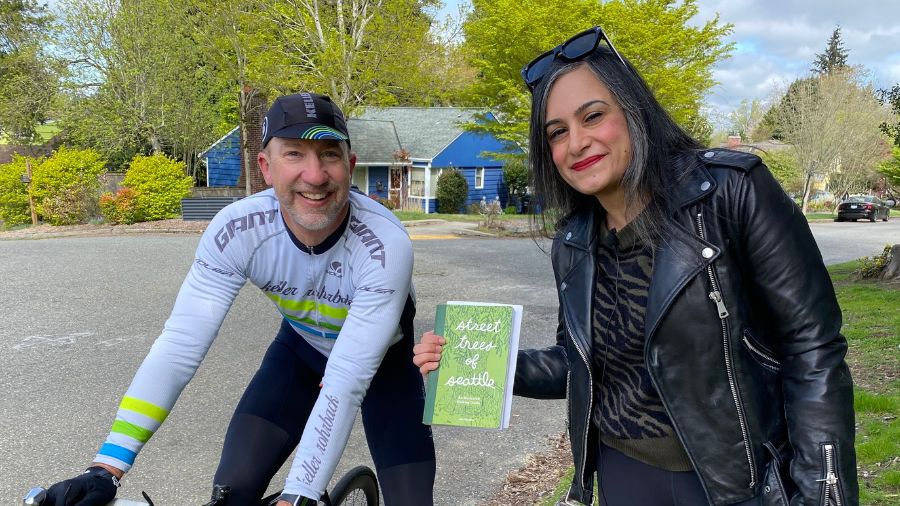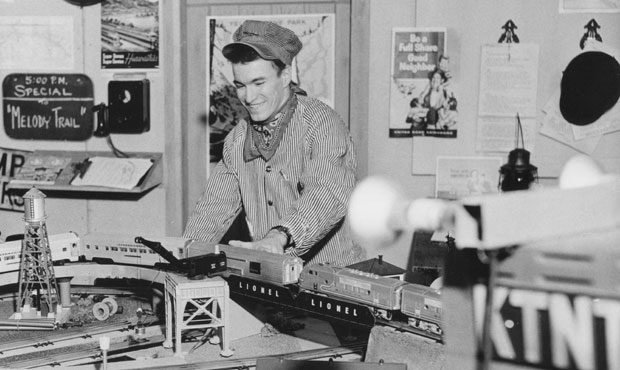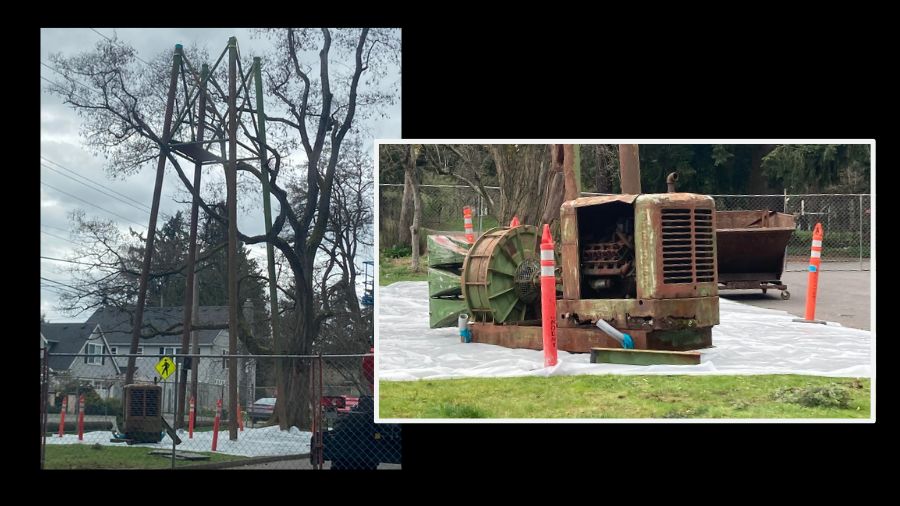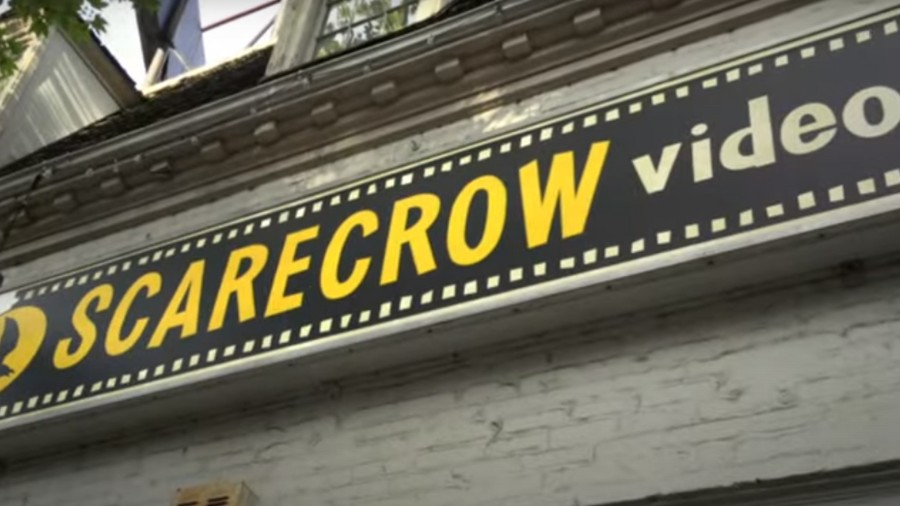Parkland School neighbors, alums and former teachers try to save endangered landmark
Jun 8, 2022, 1:49 PM | Updated: Jun 10, 2022, 11:58 am

When the old Parkland School in Pierce County was threatened with demolition last year, community members swung into action and managed to convince the owner to sell it to them instead. (Feliks Banel/KIRO Newsradio)
(Feliks Banel/KIRO Newsradio)
Once again, an old public school is being threatened by a wrecking ball, and the community surrounding it is upset that they weren’t consulted earlier about the owner’s months-old demolition plans. Parkland School is, not surprisingly, located in Parkland, an unincorporated part of Pierce County east of Tacoma along Highway 7, or what many think of as the road to Mount Rainier. It’s been listed for decades on the Pierce County Landmark Register.
The main part of Parkland School is a two-story concrete structure (with a full basement) a few blocks east of Pacific Lutheran University (PLU) that dates to 1908. Along with fronting on Highway 7 or what’s also called Pacific Avenue, the historic building is right in the center of Parkland. The original school had significant additions made in the 1930s and the 1950s, and there’s a big open playfield area in the back.
PLU bought the 40,000-square-foot school and the nearly three acres where it sits from the Franklin Pierce School District 30 years ago and then used it for a number of educational and other activities. It’s been vacant for a few years and was most recently occupied by Mount Rainier Lutheran High School about four years ago.
Parkland residents learned a few weeks ago that PLU sought in March 2022 to have Parkland School removed or “de-listed” from the Pierce County Landmark Register. Their goal is to sell the complex to a developer who will tear it down and build apartments – described as a “5-story multi-family structure with surface and garage parking” in a permit filed earlier this year with Pierce County.
It’s been a complicated process so far, but the bottom line is that the decision by the Pierce County Landmarks and Heritage Commission on PLU’s de-listing request was initially granted. Then, after public outcry over the lack of notification, the decision was rescinded and then postponed to later this month. Either way, the Pierce County Council will also have to approve any de-listing request if one is granted by the Landmarks and Heritage Commission.
What’s become apparent in the three weeks or so since Parkland School neighbors figured out what was going on is that a lot of people have come forward to share their love for the old school. And a lot of people – including Pierce County Councilmember and PLU alum Jani Hitchen – are disappointed that PLU didn’t tell anyone what they were up to before partnering with a developer and an architect, filing permits, and seeking de-listing of the longtime landmark and community fixture.
“I feel like this kind of hurt them,” Councilmember Hitchen told KIRO Newsradio. “I don’t know where the communication breakdown happened. I know that they didn’t reach out to me and it is my district, and that was a little frustrating. That definitely would have made sense . . . I think that would have been a really good step to take, and it was a little disappointing.”
All Over The Map: The Mystery of the Phantom Canal
Disappointments aside, Councilmember Hitchen appears to have become the de facto broker of whatever happens now between the Parkland School community and PLU as more people weigh in on the landmark’s future. Since the area is in unincorporated Pierce County, there is no city government to play this role.
Based on conversations with KIRO Newsradio and public comments made by Councilmember Hitchen this week, it does not appear that she opposes the demolition of Parkland School. However, she gets the highly visible role the old school plays in that part of her council district, and how much the neighbors care about what happens to it.
“Parkland has so little outward-facing [assets that say] welcome to our community,” Councilmember Hitchen told KIRO Newsradio. “This is literally the first thing you see where you know you’re in Parkland . . . the old Parkland School. So if there was a way to save an aspect of it . . . if we found a way to make it so [a portion of the building with] the name was there, and then we could save some of the stories and history.”
Zach Powers is a spokesperson for PLU. In a phone call late last week, he pointed out all the issues with Parkland School that he says make it a challenging candidate for historic preservation: it’s not up to modern building codes, including the Americans With Disabilities Act, there’s no elevator connecting the basement, first and second floors, and there is likely lead paint and asbestos present that would require abatement.
Powers told KIRO Newsradio that PLU has been trying for eight years to come up with a plan for Parkland School or to find a partner to do something with it.
Social media posts and comments from those concerned about the future of Parkland School make it clear that PLU is definitely getting blowback now about the lack of public outreach regarding their plans to demolish the building. But regardless of the bad feelings that may dominate the conversation at the moment, Zach Powers says PLU and Parkland were essentially founded by the same people 130 years ago, and PLU doesn’t take any of the community’s goodwill for granted.
“The original land decrees naming it Parkland were established by the same folks who established our university,” Powers said. “And through the years we’ve taken that connection and that stewardship seriously, and so this isn’t something we take lightly.”
“I think that for a lot of us, we think of this building the same way as we would think of some of the early buildings on our campus,” Powers continued. “It’s just kind of a situation that we find ourselves in, and the fact that we’ve done a lot of work trying to find a solution here.”
Powers also arranged for access to the inside of Parkland School early Monday evening. A simple tour of the three main floors from 1908 and portions of the later additions reveal a spartan but not unattractive old building. The old gymnasium – which was restored not that many years ago – looks like something from the set of “Hoosiers.” In some portions, there is evidence of a recent fire, and a few places where the roof is now obviously leaking. A credible architect or engineer would be required to pass accurate judgment, but to the untrained eye, it wouldn’t be an exaggeration to say the bones of the place look pretty good.
And that shouldn’t be surprising, as Parkland School is made from reinforced concrete and other building materials common in the 20th century for the construction of educational structures. Along with addressing the deficiencies pointed out by PLU’s Zach Powers – which some Parkland residents say would be present in any building of the same vintage – the old school will definitely require serious investment before it could be used for any purpose.
Some have questioned whether or not Parkland School is architecturally significant enough to warrant preservation. Huy Pham of the non-profit advocacy group Washington Trust for Historic Preservation told KIRO Newsradio that in 2022, that factor probably doesn’t even matter anymore.
“There’s a new language to historic preservation that we here at the Trust are enthusiastic to employ for these ‘most endangered’ campaigns because I think the time of speaking solely to the architectural value has passed,” Pham said. “And there are way better and more effective reasons for preserving a building now. Obviously, the architecture part is still relevant and a fun bonus, but it doesn’t have to be the leading call.”
Pham also told KIRO Newsradio that the Washington Trust will, in the very near future, name Parkland School to their list of “Most Endangered Places” in Washington State. Pham says the Washington Trust is already assisting the Parkland community with preservation advocacy efforts aimed at saving Parkland School.
Those Parkland residents unhappy with PLU and the possible demise of Parkland School have not been sitting idle. They formed a community group with a website and a Facebook page, planned a series of events, distributed flyers and made the formal request to the Washington Trust about the endangered places list.
This past Monday, many of those residents attended a community meeting held by Councilmember Jani Hitchen and fellow Pierce County Councilmember Marty Campbell (whose district also includes part of Parkland)
The meeting at John Sales Elementary in Parkland was just over an hour long and about 20 people spoke, all in favor of preserving the school. There were former Parkland School students, and former Parkland School teachers, including a father and son who both taught there. Two PLU representatives also attended at the behest of Councilmember Hitchen, but neither addressed the gathering of perhaps not quite 100 people.
Many of those who spoke expressed disappointment, frustration and occasionally anger about not being consulted by PLU. They don’t want it torn down, and they don’t want it to remain vacant and unused either.
Some appealed directly to PLU to put those plans on hold so that the community can try and do some planning and organizing to see if they can gather the resources necessary to save the school and do something positive with it. Many people expressed a desire to see the building become a community center or, if Parkland ever incorporates, that some portion of Parkland School serves as the center of civic campus – city hall, police station, and other community functions. Several speakers wondered aloud if there was a way to do both – preserve the school and build the much-needed housing on the nearly three-acre parcel.
An unidentified Parkland resident and PLU alum who spoke – who appeared to be a man in his fifties – sounded a common theme about what Parkland School represents as the last bit of true character left in that community, which happens to be located in the very center the place.
“I think for PLU the crucial thing is it is the gateway to Parkland and gateway to PLU and it identifies the character,” the man said. “Right now when you come to Parkland – we lost the theatre years ago which was really cute – but we still have the school. And we had cute Garfield Street going down there. Well, if we lose the school and you put up a bunch of apartments that are just these generic things that are not super high-end and they’re not super low-end, they’re just kind of middle of the road, PLU ends up living in a mundane community.”
“It’s losing the character,” the man said. His remarks, like many Monday night, drew vigorous applause.
Community feelings – hard and otherwise – aside, what shouldn’t be lost in this story is that PLU is a private institution who has the right to do whatever they want with their property, and the right to be as transparent or opaque about their choices and actions as they wish.
Zach Powers was unwilling to reveal much about the specifics of PLU’s plans for Parkland School, including the name of the private developer hoping to build at the site, and the sale price of the real estate. However, demolition and other permit applications are easily inspected online via Pierce County’s website. A Tacoma company called Affinity Management, which is run by someone named Kirk Rector, is listed as the developer – and, perhaps is the likely purchaser – while the architect is a Bellevue company called Veer Architecture, with principal architect Kent Smutny listed on public documents. KIRO Newsradio reached out to both on Tuesday and, so far, has not heard back from either.
Based on the permit package, Affinity appears to have already invested quite a bit of time and resources into the Parkland School project, so while PLU also won’t reveal how far along the actual sale has progressed, it may not be outside the realm to guess that Affinity has a letter of agreement or memorandum of understanding about Parkland School; that is, some kind of instrument that gives them a position when it comes to that school and that land.
What’s not clear is if Parkland residents should be focusing their efforts on convincing PLU to step back, or if Affinity is already likely to take possession in the near future.
After Monday’s public meeting, Councilmember Jani Hitchen told KIRO Newsradio that she was happy with how the evening transpired.
“We wanted people to show up and say what they were interested in doing,” Hitchen said. “PLU can’t say they didn’t hear what the community wanted. There’s a passion and interest in working to save this – or if not save it in total, to really honor the heritage of that building and the history it holds in this community.”
What’s next for Parkland School? That’s up to PLU, says Councilmember Hitchen, but she’s leading the effort to make a direct ask for more time.
“I guess the ball’s kind of in their court,” Councilmember Hitchen said. “I know that Councilmember Campbell and I are working on a letter along with [Washington State] Representative [Melanie] Morgan just to ask them to pause and see what we can do.”
“We wanted to make sure we were on the right path before we sent that letter,” Councilmember Hitchen said.
In the meantime, the Parkland School preservation advocates have organized a community march and rally this Saturday, June 11 at 1 p.m. The Pierce County Landmarks Commission will meet on Tuesday, June 21 where they will revisit PLU’s request to de-list the Parkland School from the landmark register.


